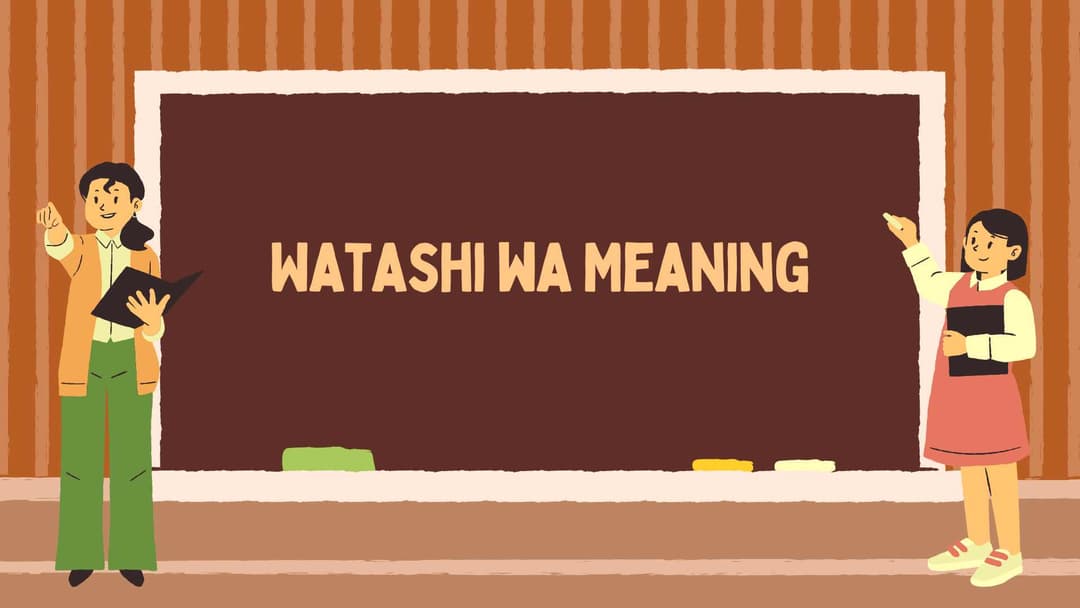
Watashi wa Meaning in Japanese: The Complete Guide to Understanding “I am” in Japanese
Published: 2025-11-05 07:34:43
Learning Japanese often begins with simple yet essential phrases, and one of the most common is “Watashi wa” (私は). But what does “Watashi wa” mean? The watashi wa meaning is essentially “I am,” and it is used to introduce yourself or state something about yourself in a conversation. If you’re wondering about “Watashi wa namae wa meaning”, it translates to “My name is…”—a phrase you’ll use frequently when meeting new people.
Understanding “watashi traduction” or the general “watashi meaning” helps you grasp how this pronoun works in different contexts. While “watashi wa” is polite and standard, you may also come across variations like “watashi wa desu” or “watashi mo meaning”, which slightly change the nuance of your sentence. Many learners type it as “watashiwa”, but remembering the space is crucial for proper grammar.
Whether you’re learning Japanese for travel, work, or studying the language, mastering watashi wa and its uses will help you introduce yourself confidently and sound natural in everyday conversation.
Want to excel in the JLPT? Check out Japanese Institute for JLPT | Accredited Training
Watashi Wa Meaning in Japanese: How to Use ‘Watashi Wa’ Correctly
The phrase “Watashi wa” (私は) is one of the first expressions every Japanese learner encounters. It literally translates to “I am” or “As for me” in English, a simple yet powerful way to introduce yourself in conversation.
Let’s break it down:
- Watashi (私) → means “I” or “me.”
- Wa (は) → is a topic marker particle that highlights what the sentence is about. (It’s written as “ha” but pronounced “wa.”)
When combined, “Watashi wa” signals that you are the topic of the sentence like saying, “Speaking about me…” or “As for me…” in English.
Example:
私は学生です。(Watashi wa gakusei desu.)
Translation: “I am a student.”
So, “Watashi wa” = “I (am)...” and whatever follows completes your thought. Whether you’re describing who you are, what you do, or how you feel, Watashi wa is your starting point for expressing yourself in Japanese.
Ready to register for the NAT‑TEST? Check out NAT‑TEST Registration | Secure Your Slot
Breaking Down the Grammar
To truly understand “Watashi wa”, it helps to see how each part functions in a Japanese sentence. Here’s the simple breakdown:
| Japanese | English Meaning | Function |
| Watashi (私) | I / Me | Subject or Topic |
| Wa (は) | — | Topic Marker |
| Gakusei desu (学生です) | Am a student | Predicate |
In Japanese, the structure is often topic–comment rather than subject–verb–object like in English.
That means you first introduce the topic (what you’re talking about) and then say something about it.
So in “Watashi wa gakusei desu”, you’re literally saying:
As for me, (I am) a student.
It’s also common in natural Japanese to omit “Watashi wa” once the topic is clear. However, beginners often use it to make their meaning explicit and that’s perfectly fine when you’re still learning to form sentences confidently.
Preparing for the next session? Check out EJU Exam (November) | Complete Guide
Watashi wa in Everyday Conversations
The phrase “Watashi wa” appears everywhere in daily Japanese conversations from polite introductions to expressing personal details about yourself. It’s one of the most natural ways to talk about who you are, what you do, or where you live.
Here are a few examples that show how flexible and useful Watashi wa can be:
- 私はインド人です。(Watashi wa Indo-jin desu.)
→ “I am Indian.”
- 私は先生です。(Watashi wa sensei desu.)
→ “I am a teacher.”
- 私は東京に住んでいます。(Watashi wa Tōkyō ni sunde imasu.)
→ “I live in Tokyo.”
Each sentence starts with Watashi wa, clearly setting you as the topic. In real-life conversations, native speakers might drop Watashi wa once the topic is understood, but for learners, using it helps build clarity and confidence when forming complete Japanese sentences.
Ready to register for the December session? Check out NAT‑Test Registration for December | Secure Your Slot
What Does “Watashi wa desu” Mean?
A common mistake among beginners is saying “Watashi wa desu”, assuming it means “I am.” However, in Japanese grammar, this phrase is incomplete.
The word “desu” (です) is a polite copula, similar to the English verb “to be.” But unlike English, it cannot stand alone — it always needs a noun or adjective before it to complete the sentence.
- Incorrect: Watashi wa desu.
- Correct: Watashi wa [something] desu.
For example:
私は学生です。(Watashi wa gakusei desu.)
Translation: “I am a student.”
So, remember Watashi wa introduces the topic “I,” and desu politely connects it to what you’re saying about yourself. Without that middle word (like gakusei – student), the sentence is unfinished and doesn’t make sense in Japanese.
Want to start or elevate your Japanese skills? Check out Online Japanese Course for Beginners to Advanced | Learn Anywhere
How to Say “I am” in Japanese
In Japanese, expressing “I am” follows a simple and logical pattern. You use:
Watashi wa [noun or adjective] desu
This structure helps you describe who you are, how you feel, or what you do all in a polite and natural way.
Here are a few clear examples:
- 私は先生です。(Watashi wa sensei desu.) – I am a teacher.
- 私は元気です。(Watashi wa genki desu.) – I am fine.
- 私は会社員です。(Watashi wa kaishain desu.) – I am an employee.
Notice how “Watashi wa” simply introduces you as the topic, while “desu” politely concludes the sentence. The key part of your identity or state goes in the middle.
So, when you hear or use “Watashi wa”, remember: it doesn’t form a complete sentence on its own. It opens the door for you to tell others who you are, what you do, or how you feel.
Explore our certified Japanese program: Japanese Language Course with Certification | Learn & Get Certified
Watashi wa Name – How to Introduce Yourself
When introducing yourself in Japanese, many beginners make a small but common mistake. They often say:
- Watashi wa [name].
While this might be understood, it sounds incomplete to native speakers. In Japanese, sentences usually end with “desu” to make them polite and complete.
- Watashi wa [name] desu. (私は[name]です。)
→ “I am [name].”
If you want to say “My name is Preeti,” the more formal and polite version is:
私の名前はプリーティです。(Watashi no namae wa Preeti desu.)
Both forms are correct and natural.
Use “Watashi wa [name] desu” for everyday introductions, and “Watashi no namae wa [name] desu” when you want to sound more formal, such as in professional or official settings.
Planning your trip or study in Japan? Check out Visa Assistance for Japan | Smooth Visa Support
What Does “Watashi wa kudasai” Mean?
The phrase “Watashi wa kudasai” is a grammatical error and doesn’t make sense in Japanese.
The word “kudasai” (ください) means “please give me” or “please do (something)”, and it’s used to make polite requests. However, it cannot follow Watashi wa, because Watashi wa introduces the topic “I,” while kudasai is a command or request form — the two don’t connect logically.
Here’s how “kudasai” is used correctly:
- 水をください。(Mizu o kudasai.) → “Please give me water.”
- コーヒーをください。(Kōhī o kudasai.) → “Please give me coffee.”
So remember whenever you want to request something, use [object] o kudasai, not Watashi wa kudasai.
Explore our credentialed Japanese language program: Japanese Language Certification | Achieve Global Fluency
Watashi vs. Boku vs. Ore – Gender and Politeness
In Japanese, there’s more than one way to say “I”, and the choice depends on your gender, formality level, and social context. This makes Japanese pronouns much more nuanced than English.
Here’s a quick comparison of the most common forms:
| Word | Used By | Politeness Level | Meaning |
| Watashi (私) | Anyone | Polite / Neutral | I / Me |
| Atashi (あたし) | Females (casual) | Informal | I / Me |
| Boku (僕) | Males (especially younger or polite) | Polite | I / Me |
| Ore (俺) | Males (casual / rough) | Informal | I / Me |
Watashi wa stands out as the most polite and universally acceptable choice. It’s suitable for formal situations, workplaces, and conversations with people you don’t know well.
As you become more comfortable with Japanese, you might hear boku or ore used among friends or peers but for learners and professionals, “Watashi wa” remains the safest and most natural way to say “I am.”
Ready to check results? Visit MEXT 2026 Results Announced | See Your Outcome
Cultural Insight: Why “Watashi wa” Matters
In Japanese, people often omit “Watashi wa” because the subject is implied.
For instance:
(私は) 学生です。([Watashi wa] gakusei desu.) → “I’m a student.”
However, when introducing yourself or emphasizing yourself, “Watashi wa” is used clearly.
Learn Japanese with Certified Experts
If you want to speak Japanese fluently, master essential grammar like Watashi wa, and prepare for JLPT or NAT-TEST exams, join the experts at:
(TLS)
📍 2/81-82, 2nd Floor, Lalita Park, Gali No - 2, Laxmi Nagar, New Delhi - 110092
📞 91 8700956038
📧 tls@teamlanguages.com
They offer beginner to advanced Japanese language programs, JLPT test preparation, and spoken Japanese courses taught by certified trainers. Whether you prefer online or offline classes, you’ll gain real conversational confidence and cultural understanding.
Thinking of taking the JLPT? Check out JLPT Exam | Essential Guide for Test Takers
Examples of “Watashi wa” Sentences
| Japanese | English Translation |
| Watashi wa gakusei desu. | I am a student. |
| Watashi wa sensei desu. | I am a teacher. |
| Watashi wa shufu desu. | I am a homemaker. |
| Watashi wa kaisha-in desu. | I am an office worker. |
| Watashi wa Nihongo o benkyou shiteimasu. | I am studying Japanese. |
| Watashi wa India kara kimashita. | I am from India. |
| Watashi wa eiga ga suki desu. | I like movies. |
| Watashi wa Tokyo ni sundeimasu. | I live in Tokyo. |
Common Mistakes with “Watashi wa”
Even though “Watashi wa” is simple, it’s easy to misuse when you’re just starting to learn Japanese. Here are some common mistakes learners make and how to avoid them:
- Watashi wa desu → Incomplete sentence.
Always add a noun or adjective before desu.
(Example: Watashi wa gakusei desu – I am a student.)
- Watashi wa kudasai → Incorrect structure.
Kudasai is used for requests, not for describing yourself.
- Watashi wa [name] → Too abrupt.
Add desu at the end to make it polite and complete.
(Example: Watashi wa Preeti desu – I am Preeti.)
- Overusing Watashi wa → Sounds unnatural.
Native speakers often drop Watashi wa once the topic is clear.
By keeping these points in mind, your sentences will sound more natural, polite, and grammatically correct.
Pronunciation Tips
Getting the pronunciation of “Watashi wa” right helps you sound more natural and confident when speaking Japanese. Here are a few simple tips:
- “Watashi wa” is pronounced as wah-tah-shee wah.
Each syllable is spoken clearly and evenly. Japanese pronunciation is smooth and rhythmic, without strong emphasis on any one part. - The “wa” particle is written as は (ha) in Japanese, but it’s pronounced “wa.” This is a unique feature of Japanese grammar that often surprises beginners.
- When speaking, keep your tone soft and steady. Japanese isn’t about stress or pitch like English — it flows gently, with each syllable given equal time.
Practice saying “Watashi wa gakusei desu” slowly a few times, and you’ll notice how naturally the sounds connect.
FAQs About “Watashi wa”
1. What is the meaning of “Watashi wa” in Japanese?
“Watashi wa” (私は) means “I am” or “As for me.” It’s a way to introduce yourself as the topic of the sentence. The phrase helps the listener know that what follows will be about you.
2. What does “Watashi wa desu” mean?
On its own, “Watashi wa desu” is incomplete and grammatically incorrect. The word desu means “to be,” but it always needs a noun or adjective before it.
Correct example: Watashi wa sensei desu. (私は先生です。) → “I am a teacher.”
3. What is “Watashi” in Japanese?
“Watashi” (私) means “I” or “me.” It’s a polite, gender-neutral pronoun used in most formal and neutral situations. Both men and women can use it safely in professional or everyday conversations.
4. How to say “I am [your name]” in Japanese?
You can say:
Watashi wa [name] desu. (私は[name]です。) → “I am [name].”
If you want to sound more formal, use:
Watashi no namae wa [name] desu. (私の名前は[name]です。) → “My name is [name].”
5. What does “Watashi wa kudasai” mean?
The phrase “Watashi wa kudasai” is incorrect.
Kudasai (ください) means “please give me”, and it must be used with an object, not with “Watashi wa.”
Correct usage:
- 水をください (Mizu o kudasai) → “Please give me water.”
- ペンをください (Pen o kudasai) → “Please give me a pen.”
6. Is “Watashi wa” formal?
Yes. “Watashi wa” is polite and formal. It’s commonly used in business meetings, interviews, or when speaking to someone older or of higher status. In casual conversations, Japanese people often drop “Watashi wa” or use other pronouns like boku or ore depending on the situation.
7. What’s the difference between “Watashi wa” and “Boku wa”?
Both mean “I am,” but they differ in tone and usage:
- Watashi wa → Gender-neutral and polite; suitable for any setting.
- Boku wa → Commonly used by men; polite but more casual than Watashi wa.
In formal or professional situations, Watashi wa is always the safer choice.
8. Can I say just “Watashi wa”?
Grammatically, yes, but it sounds incomplete. In Japanese, Watashi wa introduces a topic — you still need to add information afterward.
Example:
- Watashi wa gakusei desu. → “I am a student.”
- Watashi wa genki desu. → “I am fine.”
9. How do you write “Watashi wa” in Hiragana?
It’s written as わたしは.
Note that the particle wa is written with the character は (ha) but pronounced as “wa,” which can be confusing for beginners
10. Can men use “Watashi wa”?
Yes, absolutely. While Watashi wa is often used by women, it’s also perfectly fine for men — especially in professional or polite settings. In casual speech, men might switch to Boku wa or Ore wa, but Watashi wa is never wrong.
11. Why is “wa” written as “は” (ha)?
This is a quirk of Japanese writing. In modern Japanese, the particle “wa” is pronounced “wa” but written with the hiragana は (ha) due to historical spelling conventions. So, even though it looks like “ha,” you’ll always say “wa” when it functions as a topic marker.
12. Can “Watashi wa” mean “me too”?
Not exactly. To say “me too,” you would say “Watashi mo” (私も) instead of Watashi wa.
Example:
A: 私は学生です。(Watashi wa gakusei desu.) – I am a student.
B: 私も学生です。(Watashi mo gakusei desu.) – I am a student too.
13. Do Japanese people actually say “Watashi wa”?
Yes — but not all the time. Japanese people often omit “Watashi wa” once it’s clear who they’re talking about. However, it’s still used in introductions, formal conversations, and writing.
Final Thoughts
“Watashi wa” (私は) is one of the most common phrases in Japanese, meaning “I am” in English. The word “watashi” (私) itself means “I” or “me”, and when combined as “watashi wa”, it introduces oneself or expresses identity. In hiragana, “watashi wa” is written as わたしは. For example, “Watashi wa Indojin desu” means “I am Indian.” Similarly, “Watashi wa genki desu” means “I am fine.” The phrase “Watashi mo” means “me too,” while “Watashi no namae wa” translates to “my name is.” The expression “Watashi wa kokoni” means “I am here.” Understanding the meaning of watashi and phrases like “watashi wa desu,” “watashi desu,” and “watashi wa namae wa” helps learners form basic self-introduction sentences in Japanese. Whether you’re writing or speaking, mastering watashi in Japanese is an essential first step to fluency.


